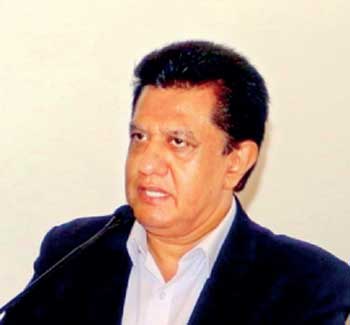Wednesday Feb 18, 2026
Wednesday Feb 18, 2026
Saturday, 30 August 2025 01:32 - - {{hitsCtrl.values.hits}}

 |
| NEXUS Chairman Prof. Charitha Herath |
The fourth Public Policy Dialogue Forum organised by the NEXUS Research Group brought a full house to the Governor’s Hall of the 80 Club on Thursday, centring debate on a blunt question: After two years of macro-stabilisation, where is Sri Lanka’s economic growth?
Opening the forum, NEXUS Chairman Prof. Charitha Herath acknowledged gains achieved with IMF support: debt restructuring traction, easing inflation, and steadier currency management. “Stability is only the first step,” he cautioned, posing three questions to frame the evening: What is holding back growth? Are we focusing on the right priorities? How do we create jobs, support enterprise, and ensure shared prosperity?
Featured speaker Tricontinental Institute for Social Research Researcher, Journalist and a Political Economist Shiran Ilanperuma argued that the current stabilisation mix has suppressed investment, the essential driver of expansion. He highlighted weak net fixed capital formation and outlined how fiscal, monetary, trade, and industrial policies have, in combination, discouraged capital deepening. His policy prescription was unequivocal: rebuild public investment capacity, mobilise domestic credit into productive capital, build self-reliance in strategic sectors, and pursue industrial policy for export diversification, “it’s investment, first and foremost.”
Complementing this, Political Commentator and Advisor of Political Economy to the Leader of Opposition Kusum Wijethilleke, pressed for a long-term investment plan paired with structural reforms, especially in education, to align skills with high-value supply chains and the export economy. Citing international shifts in the global education market, he warned that countries that failed to invest strategically lost ground to nimbler competitors. Equitable distribution of economic gains, he added, is vital for durable growth.
The discussion moderated by Advocata Institute CEO Dhananath Fernando drew a distinguished audience, including representatives from foreign missions (notably Ambassador of Italy Damiano Francovigh and delegates from the Embassy of China and the Indian High Commission), Main Opposition SJB MP Dr. Harsha de Silva, academics such as Prof. Rohan Samarajiva and Dr. Sujatha Gamage, political economists including Dr. Vageesha Gunasekara, former Parliamentarians Eran Wickramaratne, Ferial Ashraff, Pramitha Tennakoon, Karunarathna Paranawithana, Premnath C. Dolawatte, leading legal professionals Shiral Lakthilaka and Pium Perera, and civic voices Charith Abeysinghe, Ravi Jayawardane, and Nimalka Fernando.
During the open floor, Dr. Harsha de Silva emphasised that while labour and capital remain the core ingredients of growth, integrating into regional supply chains is the real unlock for Sri Lanka’s next phase. Ambassador Francovigh highlighted regional cooperation and free-trade agreements as pathways to larger markets, citing Vietnam’s ascent through deep trade-network participation, and urged practical networking between firms and markets to speed results. Nimalka Fernando called for a hard look at the labour dimension, recommending a reassessment of conditions and skills development in the apparel sector to raise competitiveness and earnings. Dr. Sujatha Gamage pointed to a State-sector capability gap, warning that without stronger managerial and technical skills, technology transfer and administrative reform will struggle to take root. Rounding out the discussion, Dr. Vageesha Gunasekara flagged the ease-of-doing-business bottleneck, noting reports of roughly 240 approvals to start operations and 250 days for EIA clearance, timelines that must be streamlined to attract and retain investment.
Across interventions, a common thread emerged: stabilisation has opened a window, but growth now hinges on investment, skills, and speed, mobilising capital into productive sectors, aligning human capital with market needs, tightening links to regional supply chains, and cutting red tape that drags on new projects.
Closing the session, NEXUS emphasised that the Dialogue series will continue to convene policymakers, practitioners, and scholars to translate ideas into actionable reform, aimed at shifting Sri Lanka decisively from stable stagnation to dynamic, broad-based growth.